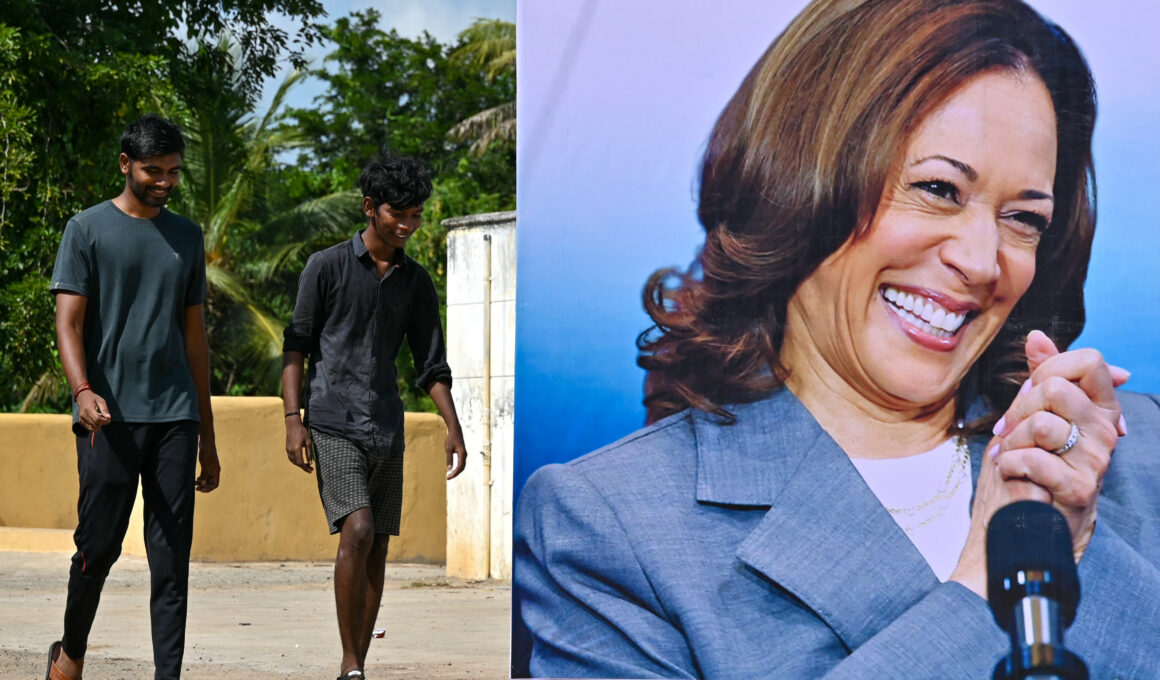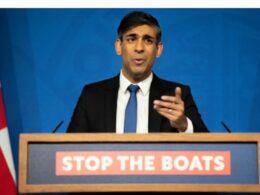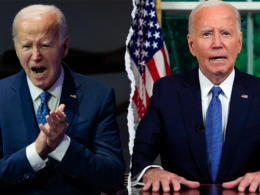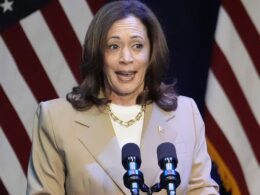The whole world is watching as dueling campaign trails blaze between presumptive Democratic U.S. presidential nominee Vice President Kamala Harris and Republican nominee former President Donald Trump.
While the fight over foreign policy has largely focused on wars raging in Ukraine and the Gaza Strip, as well as an intensified global competition with China, two nuclear-armed rival powers in South Asia are also eyeing the outcome of what has emerged as a historically turbulent election season. Officials from India and Pakistan tell Newsweek they are preparing to work with either candidate in pursuit of stronger ties.
For India, the relationship with the U.S. has especially been on the upswing. Once-fraught ties during the Cold War have evolved this century into a growing partnership that includes greater cooperation in areas such as intelligence-sharing and defense that has been expanded under both Trump and his successor, President Joe Biden.
The partnership has not been without its challenges under both administrations. But Indian officials today exude confidence that they would be able to work constructively with either Trump or Harris, who would become the first-ever U.S. presidential candidate of Indian heritage if confirmed by her party next month in the wake of Biden’s late-stage dropout.
“India and the U.S. have a Comprehensive Global Strategic Partnership,” a spokesperson for the Indian External Affairs Ministry told Newsweek. “The India-US relationship enjoys bipartisan support in the US and has strengthened under every administration.”
A spokesperson for the Indian Embassy to the U.S. also noted how “India and United States enjoy a comprehensive global strategic partnership driven by shared democratic values” and told Newsweek that “the relationship enjoys wide support in both India and USA and we are confident of further strengthening it.”
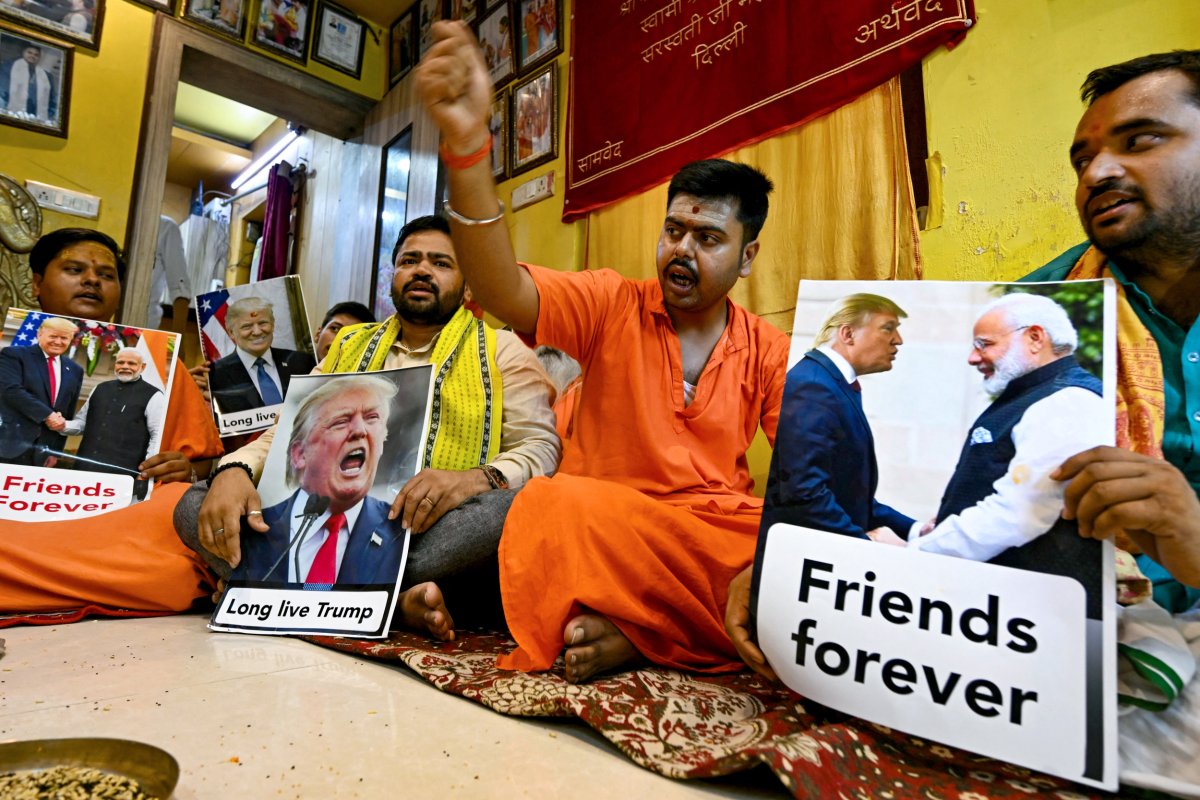
‘Namaste Trump!’
The U.S.-India partnership received a significant boost under the Trump administration as the former president reinvigorated the Quadrilateral Security Dialogue (Quad), a coalition between the two nations alongside Australia and Japan. In an exclusive interview with Newsweek in April, Indian Prime Minister Narendra Modi said that, through their various initiatives, “the Quad countries are demonstrating their vision of a free, open and inclusive Indo-Pacific.”
As Modi and other Quad member leaders and officials have pointed out, the coalition is not officially targeted at any other nation and it does not rise to the level of a military alliance, a concept rejected by India’s independent foreign policy outlook. The Trump administration, however, had made it clear that it sought to use the bloc as a lever against growing Chinese influence in the region and Beijing took note.
Trump established a personal chemistry with Modi while in office, a bond put on full display during the “Howdy Modi” and “Namaste Trump!” events held during the two leaders’ visits to one another in 2019 and 2020, respectively. The latter event also showcased Trump’s extensive popularity among the world’s largest population.
A Pew Research Center poll published in January 2020 showed that Indians were among those confident of Trump “to do the right thing regarding world affairs.”
Another survey published by the same institution just last month showed that India was among only eight out of 34 nations polled in which there was “no significant difference between Biden and Trump” in terms of confidence. All but two of the remaining countries had substantially more faith in Biden’s leadership.
On the 2024 campaign trail, Trump has referred to Modi as a “great guy” and has voiced his intentions to improve relations with New Delhi. At the same time, he has repeatedly threatened to slap a retaliatory tax on India over its high tariffs on certain U.S. products, using Harley-Davidson motorcycles as a frequent example during recent rallies.
“I don’t blame India,” Trump said during a campaign event held last week in Michigan. “I blame us for allowing it to happen. It’s not going to happen anymore.”
A Biden-Harris Balancing Act
Last year, under Biden, the U.S. and India resolved their trade disputes at the World Trade Organization, including the feud over Trump-era tariffs. But the Biden administration largely capitalized and expanded on other Trump-led initiatives on India and the U.S. leader also both visited and received Modi during his time in office, albeit to less fanfare.
Biden’s trip last year played out against the backdrop of a trial of an Indian citizen charged with plotting to kill a Sikh separatist in New York City on behalf of the Indian government. The indictment came as the U.S. expressed concern over the killing of another Sikh separatist in Canada, also allegedly linked to the Indian government, which has vehemently denied any connection to either plot.
The Biden administration has generally avoided criticisms of New Delhi in the interest of broader geopolitical aims. Some frictions have emerged among these goals as India has maintained its historic partnership with Russia throughout the ongoing war in Ukraine, continuing to purchase oil and both buy weapons from and sell to Moscow despite U.S.-led sanctions, but even the White House’s language here has been cautious.
After U.S. Assistant Secretary of State for South and Central Asian Affairs Donald Lu expressed the Biden administration’s “disappointment” over Modi’s recent visit to Moscow to meet Russian President Vladimir Putin, Indian External Affairs Ministry spokesperson Randhir Jaiswal hit back at a press briefing Thursday.
“You must understand that India has a longstanding relationship with Russia that is based on mutuality of interest,” Jaiswal said. “In a multipolar world, all countries have the freedom of choice.”
Overall, the U.S.-India relationship has trended toward even closer ties, something Harris has advocated for as well. The vice president, who is of both Indian and Jamaican descent, spoke at length about her personal ties to India during Modi’s visit to Washington, D.C., last year and her family’s ancestral village of Thulasendrapuram in the southern state of Tamil Nadu has expressed jubilation over her chances of becoming U.S. president.
But Harris has also invoked these ties to criticize India on human rights, saying during a meeting with Modi in 2021 that she knew “from personal experience and from my family of the commitment of the Indian people to democracy and to freedom and to the work that may be done and can be done to imagine and then actually achieve our vision for democratic principles and institutions.”
It wasn’t the first time she spoke up on issues viewed as deeply sensitive within India. Two years earlier, during her last presidential bid, then-Senator Harris weighed in on the fate of Kashmir, a disputed territory divided and claimed by both India and Pakistan, after Modi revoked the special status of India-administered Jammu and Kashmir in 2019, a move touted as a step toward stamping out a decadeslong insurgency.
“We have to remind Kashmiris that they are not alone in the world,” Harris said at the time. “We are keeping track of the situation. There is a need to intervene if the situation demands.”

Attention Deficit on South Asia
While Harris has largely refrained from opining on the Kashmir issue since assuming the vice presidency, her past remarks are widely remembered in Pakistan. Islamabad has campaigned extensively against New Delhi’s 2019 decision, viewing it as a unilateral violation of international law and a provocation in a dispute that has fueled past wars and still occasional border skirmishes between the two nations.
“We were reassured by some of the statements that were made about Kashmir in 2019, and I include those of Vice President Kamala Harris at that time,” Massoud Khan, Pakistan’s outgoing ambassador to the U.S., told Newsweek. “There was a groundswell of support for the rights of Kashmiris.”
Khan, whose three-year tenure as envoy concluded at the end of last month, called on the U.S. today “to demonstrate statesmanship, statesmanship for mediation for other countries towards dialogue, resolution of disputes,” including the feud over Kashmir.
“That’s the role of the United States as a preeminent nation in the world order,” Khan said. “So, we hope that whichever administration is elected, whichever president and cabinet is put in place, they would pay attention to peace and stability in South Asia, because I think that the future of the world hinges on stability in South Asia for a number of reasons.”
The region has indeed proven to be among the most challenging in terms of security, with Pakistan feeling the deadliest spillover of ongoing unrest in neighboring Afghanistan. The country has had an outsized impact on U.S.-Pakistan relations, which were fortified by their mutual aid for rebel mujahideen against a Soviet-led intervention in Afghanistan in the 1980s and once again in the 21st century as the “War on Terror” was launched against some of the very same insurgents they once supported.
Today, the Islamic State militant group’s largely Afghanistan-based Khorasan branch (ISIS-K), the deadliest and furthest-reaching of the many insurgencies active in the region, “was spawned by the War on Terror,” Khan said.
Such is the case for other groups such as the Tehreek-e-Taliban Pakistan (TTP), also known as the Pakistani Taliban, which continue to wreak havoc in the region, he argued. As such, he said the threat “requires attention,” a level of which he believes has been absent since the U.S. withdrawal from Afghanistan, a process that began under Trump and ultimately carried out under Biden in August 2021.
“The attention here in Washington immediately after 2021 dissipated because of a number of reasons,” Khan said. “It was Ukraine, it was this fixation with Indo-Pacific strategy, then there was October 7th and its aftermath there in the Middle East.”
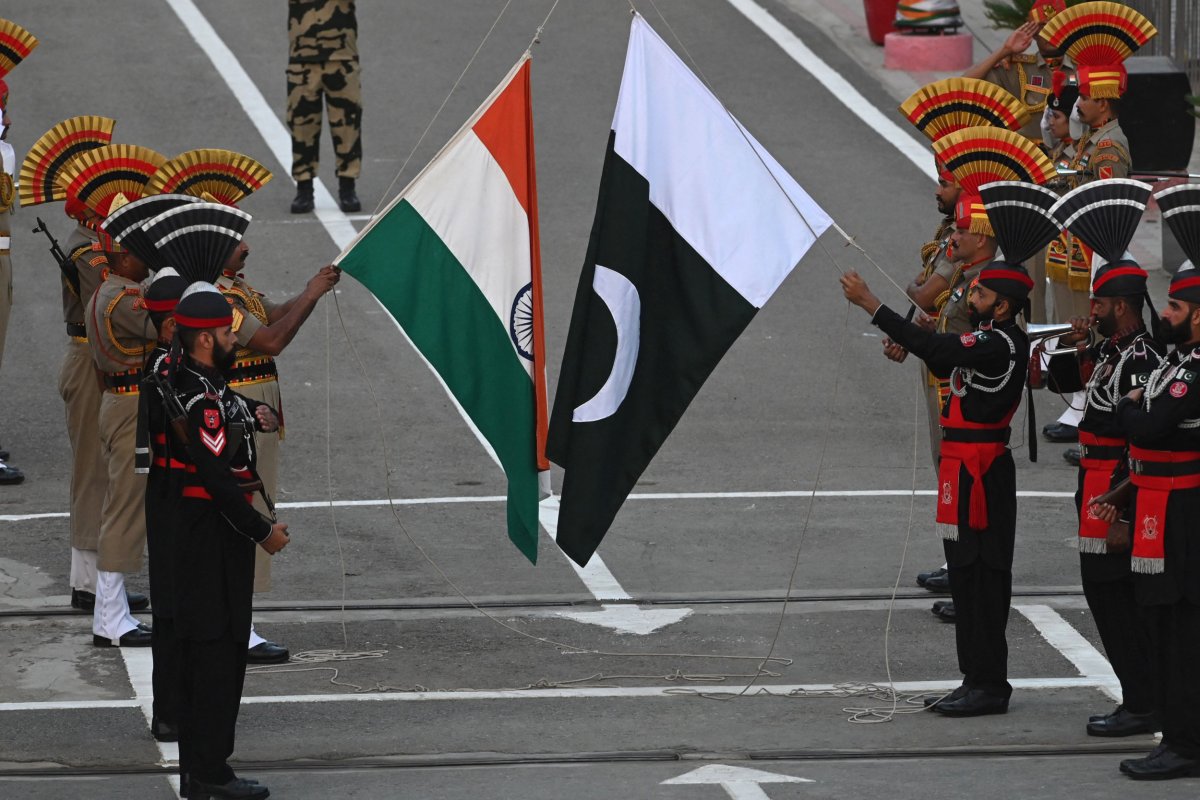
Prayers for Peace
Several other important factors complicate the relationship between the U.S. and Pakistan. While Trump significantly boosted ties with Modi while in office, he also struck a positive relationship with then-Pakistani Prime Minister Imran Khan, a fellow celebrity-turned-politician, only for the former cricket star to be ousted in an April 2021 no-confidence vote that he and his supporters have alleged the Biden administration helped put into motion.
With the former premier now in prison over an array of charges raised under his successor, Prime Minister Shehbaz Sharif, and Trump also facing a recent indictment and further pending criminal cases, Imran Khan spokesperson Syed Zulfiqar Bukhari told Newsweek earlier this year it was “hard not to draw parallels” between the two men.
“We had a fantastic relationship with the United States, between President Trump and Imran Khan,” Bukhari said. “We had hoped for the same under Biden.”
And while Bukhari argued that Biden “had an opportunity to stand on the side of democracy” in response to Khan’s arrest and subsequent jailing, he argued that there has been little talk and no movement from the White House on the issue. Echoing Massoud Khan, Bukhari said that “the United States, sitting in the position that it is in as a superpower of the world, should have paid more attention to a 250 million population country.”
Beyond Pakistan’s domestic politics, however, there is Pakistan’s robust relationship with China, another product of Cold War-era dynamics, that has evoked wariness in Washington.
Massoud Khan stated that “we have very important relationships” with both the U.S., “the most powerful nation on earth and biggest economy in the world,” and China, “an eminent nation,” that has “caught up and it is developing economically, and it is developing economically at a tremendous speed, and it has influence.”
Thus far, the departing envoy said, “The United States or China haven’t directly asked us to choose any of the two countries, so I would say that this is a good model.”
While the current administration largely followed Trump’s toughened stance on Beijing, a cautious thaw has emerged in recent months under Biden. Meanwhile, Chinese officials have already taken issue with the language used by the three-time Republican nominee in vowing even harsher measures against the People’s Republic.
But with tumult gripping the U.S. as it navigates a rocky road to November, Massoud Khan ultimately expressed his sincere hopes for a smooth process, recognizing that volatility felt in Washington would likely resound worldwide.
“We have to work with whichever administration is chosen by the people of the United States,” Massoud Khan said. “Of course, all we want is that the United States should have peace and stability and political harmony within the country, because the United States is a global leader, what happens here impacts global politics and economics.”
“And therefore,” he added, “we pray for the viability of political partners which are conducive to a more harmonious society.”
Uncommon Knowledge
Newsweek is committed to challenging conventional wisdom and finding connections in the search for common ground.
Newsweek is committed to challenging conventional wisdom and finding connections in the search for common ground.




